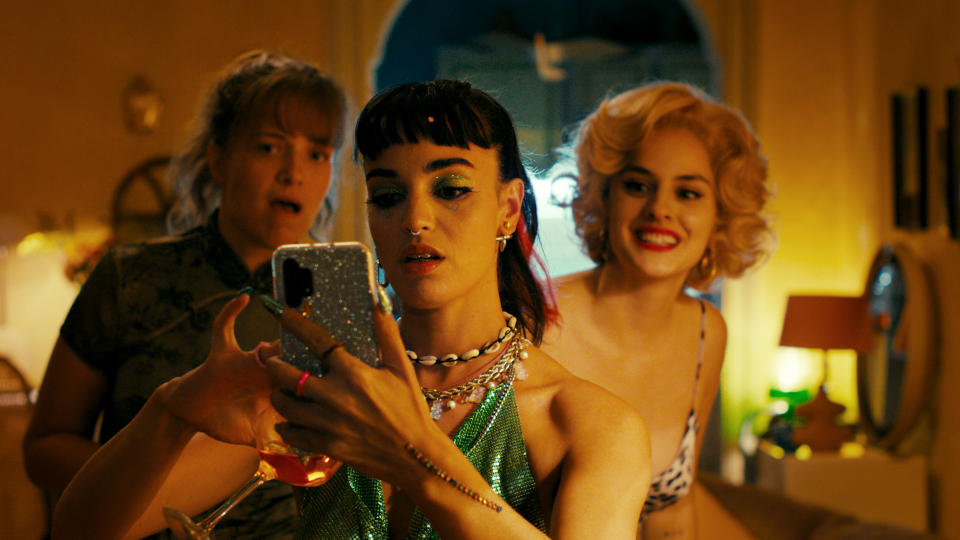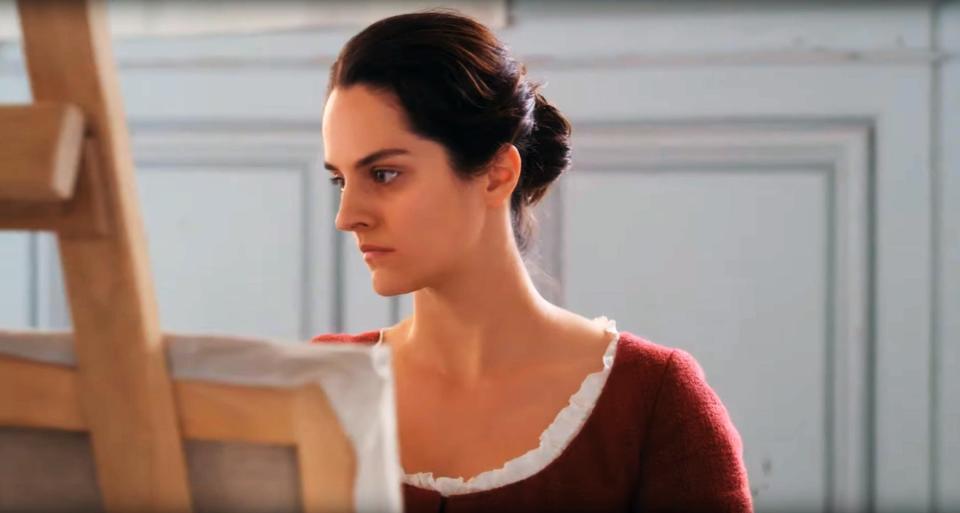Noémie Merlant Says Gory Sisterhood Tale ‘The Balconettes’ Was Sparked By Her Experiences With “Microaggressions, Major Aggressions And Even Physical Violence”

Noémie Merlant’s star is rising as an actress. Baby Ruby and Tár won her international recognition across 2022 and 2023, while anticipation is growing around her starring role in Audrey Diwan’s English-language reboot of erotica classic Emmanuelle. In the meantime, Merlant is hitting Cannes with The Balconettes, her second film in the director’s chair after Mi iubita, mon amour. Set against a Marseille heatwave, the riotous comedy and gorefest co-stars Merlant alongside Souheila Yacoub and Sanda Codreanu as female flatmates who are pushed to the brink when a late-night drink with an attractive neighbor (played by Emily in Paris actor Lucas Bravo) takes a bloody turn.
DEADLINE: What was the inspiration for Les Balconettes?
More from Deadline
NOéMIE MERLANT: Four, five years ago I fled my home in a sort of escape from something that was suffocating me. I sought refuge with two girlfriends who were living together and stayed for several months. I’d never been so much myself, or so free. I’d always lived with a man and play-acted, not only because of the other person, but because of myself and what I thought society expected. I wasn’t playing the role that I wanted to play in my life. With my friends, I was free to be myself, even in terms of my body… There was a release. Their way of looking at things and listening was different. We talked about our relationship with sexism, misogyny and patriarchal oppression. This place became our cocoon, outside we didn’t feel the same freedom. That’s when I came up with the idea of ??making a film where I would be among women in an apartment in an atmosphere of complete freedom, both in terms of our bodies and from oppression outside.
DEADLINE: The underlying theme is violence against women. It’s a topic you’ve been outspoken about in the past. Why do you feel so strongly about it?
MERLANT: I had my first brush with violence when I’d just started modeling. I had a traumatic experience with a photographer. I was 17 years old and had just left home and moved to Paris. It felt as if, straight away, I was being told, “There you go, you’re a woman, you’re entering the adult world. This is how it’s going to be.” Like many women, I’ve suffered microaggressions, major aggressions, and even physical violence with one partner, who I managed to leave. I needed to talk about these experiences, and then I did my own investigation. I’ve met quite a few men who have been victims of men too, although I don’t talk about it in the film. I wanted to, but I had to cut it to tighten up the story.

DEADLINE: Yet, the tone of the film is very comedic, farcical… there are plenty of laugh-out-loud moments there.
MERLANT: When we talk, what helps me, my friends, to escape from past trauma is humor, the absurd. It’s a way of keeping our heads above water. I also wanted there to be vulgarity. There’s something in vulgarity that is very true, very sincere, and intimate. It’s something that is not often shown or associated with women. I wanted to give my characters permission to be vulgar. Humor is also a way of reappropriating our stories. Allowing yourself to make fun of your attackers is a very powerful weapon. It was important to keep the absurd and comical tone… It wasn’t always easy to achieve this balance, but it was of vital importance for me with this film.
DEADLINE: You play with genres in the film. Where does that come from?
MERLANT: I knew I wanted there to be gore. I had this idea of two parts: initially, it feels like a nice little comedy between women, but then it shifts into horror and fantasy. I grew up watching Korean and Japanese films, which mix humor, the absurd and horror. Those were the only films I watched with my sister. Another reference is Vera Chytilová’s Daisies.
DEADLINE: Céline Sciamma, who you’ve been close to since co-starring alongside Adèle Haenel in Portrait of a Lady on Fire, takes a co-writer credit. How did that come about?
MERLANT: Above all, Céline is a friend, and she also changed my life in several ways. Firstly, Portrait changed my career, because it was a film that had international resonance. But beyond that, Céline changed my vision of how to work as an artist. She has a really collaborative approach to working, which I haven’t always experienced. Her methods are much more about sharing, and that you don’t need intimidation to get things out of actors, I’m sufficiently tough on myself. Céline talks about this in her interviews, but when you create a workspace without too much hierarchy, with real respect and kindness, in which everyone can contribute, that is where there are many more surprises and creative outcomes. She also changed my way of thinking about the female gaze, female desire. It was after Portrait that I left everything and ran away to my friends.

DEADLINE: How did Sciamma contribute?
MERLANT: At first, I was writing alone. I didn’t dare ask her. I didn’t want to encroach on our friendship. But Céline asked to read it and came back saying she loved it. She agreed it was a story that needs to be told with humor and told me she was there for me and would do all she could to help me, from helping secure the finance, to writing.
DEADLINE: How did you find it, mixing acting and directing?
MERLANT: There were advantages and disadvantages. We saved and lost time. I couldn’t watch the scenes in which I was playing on the monitor, so we wasted some time there, but then, I knew my character by heart, so I knew exactly what I had to do in each scene. That was a time-saver because I didn’t have to explain what I wanted to achieve to another actor. Sanda Codreanu who plays Nicole, is my friend in real life, which made everything very fluid in terms of playing the friendship. My sense of comedy was born with Sanda. She is very, very funny. She was always there with me on set. She and my cinematographer Evgenia Alexandrova were my safeguards. Céline was also there during filming. Not all the time, but she came on set several times.
DEADLINE: Another aspect of the film is the liberated way in which you show the female body, with Souheila Yacoub’s character Ruby topless for most of the film and your character also stripping off.
MERLANT: I just wanted to be free with our bodies. Ruby simply wants to be bare-chested like a man. It’s funny, because when we shot the film, it was in the middle of a heatwave — it was 40 degrees — and a woman was stopped in the street because she was walking around bare-chested, while all around her there were men walking around shirtless. I can’t understand the difference between a woman’s nipple and a man’s nipple. When I look at the body, I don’t sexualize it. I wanted there to be a complete sense of freedom, liberation, showing everything from farting to cellulite. I wanted this sense of these women not having to meet expectations, away from the male gaze and society.
DEADLINE: The Balconettes very much taps into the zeitgeist in France, which is seeing a fresh #MeToo moment sparked by actress Judith Godrèche’s campaign against sexual assault and harassment in the French film industry. France has been here before, when Adèle Haenel made #MeToo allegations in 2020 but didn’t get much support. Are things changing?
MERLANT: That was terrible. Nobody supported Adèle. Well, nearly nobody. There were people who wanted to but didn’t dare. They were scared. I hope things are changing. There’s still a lot of resistance and denial, but we’re seeing more and more women, and men, speaking up. A space is being created but we need to take care to preserve and make it bigger. I am trying to be optimistic, but you never know, backlashes often follow around the corner, I hope we’re going in the right direction.

DEADLINE: We were also expecting to see you in Cannes with Audrey Diwan’s Emmanuelle. Where is that film? Can you talk about it?
MERLANT: I’ve just seen it, an unfinished version. I think people’s expectations are linked to the 1973 film, but it has nothing to with it. She has reappropriated the character of Emmanuelle, and it’s even as if the character of Emmanuelle has reappropriated herself. We’re with a woman who is cut from her pleasure, from her desire. There are interesting resonances with my film — even though they’re not at all the same — in this quest to free herself from something and reclaim her body, to reconnect with her desire as a woman. It’s done with ultra-elegant eroticism, and Audrey’s eye is so sensual. This film is a powerful journey. I came out of it with a real desire to live.
Best of Deadline
Hollywood & Media Deaths In 2024: Photo Gallery & Obituaries
2024 Premiere Dates For New & Returning Series On Broadcast, Cable & Streaming
2024-25 Awards Season Calendar - Dates For Oscars, Tonys, Guilds, BAFTAs, Spirits & More
Sign up for Deadline's Newsletter. For the latest news, follow us on Facebook, Twitter, and Instagram.
